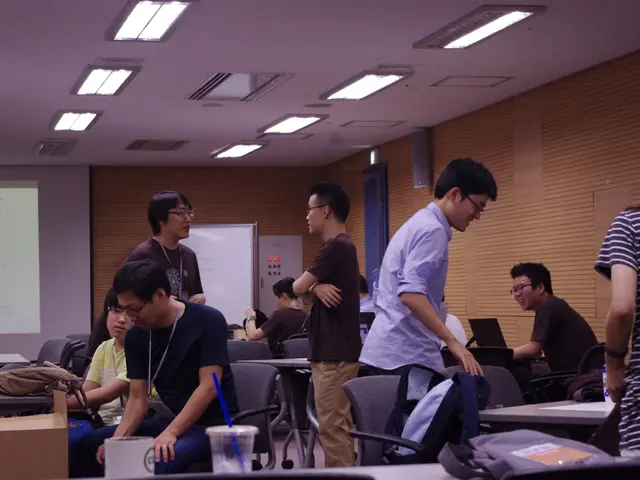Enhancing Job Opportunities and Career Advancement for Youth in Film, Television, and Gaming Industries
=====================================================================================================
A new report, commissioned by the Creative Industries Council and funded by Creative PEC and Mission 44, has shed light on the migrant and skills needs of creative businesses in the UK. The report, conducted by Work Advance, was contributed to by Aline Collins and Directors Lesley Giles and Heather Carey, as well as Associate Dan Wilks.
The report focuses on the UK's Film, TV, Radio, and Games Industries, and details the current landscape of support for disadvantaged young people within these sectors. The researchers express concern that while there are nearly 200 equality, diversity, and inclusion (EDI) schemes across the creative industries, there are limitations in provision, short-term funding, a one-size-fits-all approach, being too London-centric, and lacking evaluation evidence.
The report does not delve into the international, trade, and immigration aspects mentioned in related research reports. Instead, it offers nine recommendations for the screen and games industries, and for policymakers, including a call for the industries to think differently about the way they offer support for young people.
One of the key findings of the report is that the UK's creative industries can better support disadvantaged young people by expanding practical, accessible career insight and hands-on work experience beyond current EDI schemes. This includes industry-led career insight programs, paid, structured internships and apprenticeships, partnerships with youth organizations and hubs, resources and lesson plans linked to school curriculums, and a focus on regional opportunities and local initiatives.
Industry-led career insight programs such as Discover! Creative Careers Month provide young people with real job role exposure, virtual talks, and interactive events to inspire them and demystify career pathways. Paid, structured internships and apprenticeships targeted specifically for young people from disadvantaged backgrounds, like Sony Music’s 12-month paid internships and A&R Academy, ensure financial barriers do not exclude them. Partnerships with youth organizations and hubs connect vulnerable or at-risk young people with tailored support and mentoring, helping overcome non-financial barriers like mental health or criminal justice involvement.
The report also recommends resources and lesson plans linked to school curriculums, raising awareness early among ages 11-18 about creative sector careers and how to access them. A focus on regional opportunities and local initiatives, such as apprenticeship funding shifts and youth employment programs, can reduce geographic inequalities and provide opportunities for disadvantaged young people in all parts of the UK.
The limitations of current EDI schemes often include insufficient engagement with disadvantaged youth, lack of paid opportunities, and limited support beyond recruitment. Expanding holistic approaches that combine education, paid work experience, mentoring, and community partnerships will better open up pathways into creative industries for those currently underserved.
In summary, a multifaceted approach combining paid work placements, industry engagement in schools, and targeted support through youth hubs and local initiatives can more effectively overcome existing EDI scheme limitations and help disadvantaged young people access quality jobs and careers in the UK's Film, TV, Radio, and Games sectors.
[1] Discover! Creative Careers Month: https://www.discovercreativecareers.com/ [2] Sony Music’s 12-month paid internships and A&R Academy: https://www.sonymusic.com/about-us/careers/internships/ [3] Partnerships with youth organizations and hubs: https://www.workadvance.org/what-we-do/ [4] Resources and lesson plans linked to school curriculums: https://www.creativeindustries.co.uk/resources/careers/ [5] A focus on regional opportunities and local initiatives: https://www.gov.uk/government/publications/apprenticeship-funding-in-england/apprenticeship-funding-in-england
- The creative industries in the UK can implement industry-led career insight programs to offer real job role exposure for young people.
- The report encourages the establishment of paid, structured internships and apprenticeships for disadvantaged young people in the creative industries.
- Partnerships between creative industries and youth organizations and hubs can provide support and mentoring to vulnerable young people.
- Resources and lesson plans linked to school curriculums can raise awareness among children aged 11-18 about careers in the creative sector.
- Focusing on regional opportunities and local initiatives can reduce geographic inequalities and provide opportunities for disadvantaged young people across the UK.
- EDI schemes in the creative industries may lack evaluation evidence and lack engagement with disadvantaged youth.
- A focus on holistic approaches that combine education, work experience, mentoring, and community partnerships will better address the needs of disadvantaged young people.
- The report highlights the limitations of current EDI schemes, including insufficient financial support and short-term funding.
- By expanding practical, accessible career insight and hands-on work experience, the UK's creative industries can better support disadvantaged young people.
- The report did not delve into international, trade, and immigration aspects of the creative industries.
- Policymakers should consider the recommendations for the screen and games industries offered in the report.
- Expanding career insight programs beyond current EDI schemes will offer real job role exposure to young people in the creative industries.
- Paid, structured internships and apprenticeships targeted for young people from disadvantaged backgrounds can ensure financial barriers do not exclude them from the creative industries.
- Industry partnerships with youth organizations and hubs can help overcome non-financial barriers like mental health and criminal justice involving young people.
- Resources and lesson plans linked to school curriculums can help raise awareness about creative sector careers and how to access them at an early age.
- A focus on regional opportunities and local initiatives can provide equal opportunities for disadvantaged young people across the UK.
- The limitations of current EDI schemes may exclude disadvantaged young people from accessing quality jobs in the creative industries.
- The report calls for the creative industries to think differently about the way they provide support for young people.
- By shifting apprenticeship funding and implementing youth employment programs, opportunities for disadvantaged young people in regional areas can be increased.
- The report reveals concerns about the current provision and evaluation of equality, diversity, and inclusion (EDI) schemes in the creative industries.
- One of the key findings of the report is that the UK's creative industries need to expand their offerings beyond current EDI schemes.
- The report recommends a call for the screen and games industries to consider the nine recommendations offered for a more inclusive approach.
- The researchers found a need for more research and evaluation of EDI schemes in the creative industries.
- The report does not offer specific recommendations for the Film, TV, Radio, and Games industries outside of the UK.
- The report highlights the importance of expanding career insight and work experience opportunities for disadvantaged young people in the creative industries.
- The UK's creative industries have nearly 200 EDI schemes, but there are limitations in provision and evaluation evidence.
- The report encourages the creative industries to think differently about the way they offer support for young people in the UK.
- The report emphasizes the importance of addressing geographic inequalities in the creative industries.
- Sony Music's 12-month paid internships and A&R Academy are examples of targeted support for young people from disadvantaged backgrounds.
- The report points out that current EDI schemes may be too London-centric and lack a focus on regional opportunities.
- The report recommends creating resources and lesson plans linked to school curriculums to raise awareness about creative sector careers for young people.
- The report encourages creative industries to collaborate with youth organizations and hubs to provide targeted support and mentoring for disadvantaged young people.
- The report emphasizes the importance of data and research in identifying and addressing the needs of disadvantaged young people in the creative industries.






